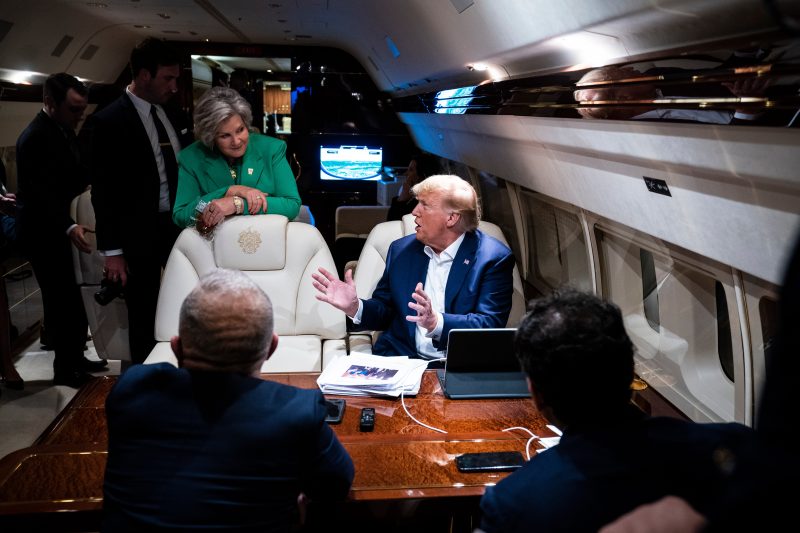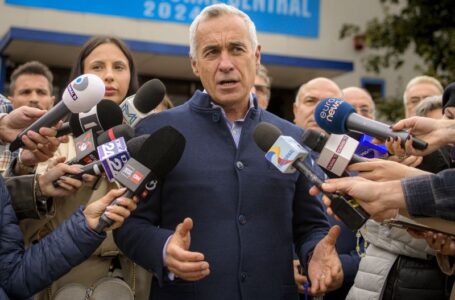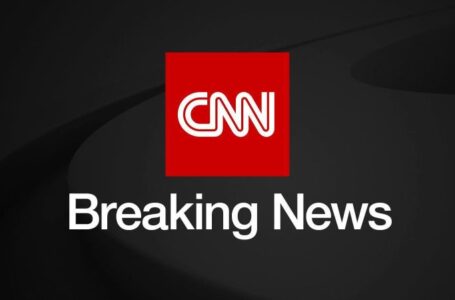Prosecutor requests 20-year sentence for Dominique Pelicot in mass rape trial
Eight years ago, Trump vowed to ‘drain the swamp.’ Now he swims in it.


When clients tell Mercury Public Affairs, a consulting and lobbying shop with 18 offices worldwide, that they’re concerned about Donald Trump’s possible return to office, the firm has just the person to ease their nerves: Bryan Lanza.
Lanza, a Mercury partner and longtime Republican strategist, is well-suited to the task. In between client breakfasts in far-flung parts of the world, he serves as a senior adviser to Trump’s presidential campaign. So he’s a natural person to help clients understand how Trump’s positions on tariffs and other hot-button issues might play outin a second term, according to two Mercury colleagues who spoke on the condition of anonymity to discuss internal business dealings.
“He gives them assurances that there will be life after Nov. 5,” said one of the colleagues, referring to Election Day.
Lanza declined to comment through a Mercury spokesman. A Trump spokesman did not respond to questions.
Eight years after Trump entered politics promising to reduce the influence of Washington lobbyists — to “drain the swamp,” as he put it — advocates for corporate interests, including companies based in China and other foreign countries denounced by Trump, now sit at virtually every level of his campaign. Lobbyists are represented among high-level staff, informal advisers and party faithful who planned the summer convention in Milwaukee, as people with access to Trump or insight into his at-times erratic decision-making turn that knowledge into moneymaking opportunities.
Trump’sde facto campaign manager, Susie Wiles, is a Mercury partner alongside Lanza — and one of at least five people advising Trump who have advocated for tobacco, vaping or cannabis interests in recent years, according to lobbying disclosures and interviews.
At least two people close to the campaign have advocated for Chinese-owned TikTok. One of them, former Trump White House aide Kellyanne Conway, served not as a registered lobbyist, according to people familiar with the arrangement, but as a consultant for Club for Growth, the conservative group whose biggest donor is invested in TikTok’s parent company. The other, David Urban, is a veteran of Trump’s two previous campaigns and still travels frequently with the former president — and has registered to lobby for the company. He now works for BGR Group, a prominent lobbying firm with foreign clients including India. He declined to comment.
Trump’s position on these issues has shifted notably. A longtime smoking critic who used his time in office to crack down on e-cigarettes, Trump now presents himself as a savior of vaping. Earlier this year, he also reversed his position on TikTok, joining the app he previously sought to ban.
On Thursday, the Trump campaign invited a range of Washington lobbyists and others to a fundraiser with a top campaign official, Chris LaCivita, as the event’s featured guest. Ticket prices went from $500 to $10,000, according to a copy of the invitation reviewed by The Washington Post.
Meanwhile, the expression “drain the swamp,” a ubiquitous line in Trump’s speeches and online posts when he first ran for president, has all but faded away. A Washington Post analysis found that Trump has used the metaphor just 59 times on Truth Social, his social media site, in the past two years — fewer times than he wrote about it on Twitter in October 2016 alone.
The rallying cry has also morphed from its original meaning — no longer just a criticism of special interests but an expression of grievance with government prosecutors who’ve charged him with wide-ranging crimes over the last two years. Trump and his allies have introduced a new hashtag, #NewHoaxSameSwamp.
Some of the key people advising Vice President Kamala Harris, the Democratic presidential nominee, also have corporate ties. Her brother-in-law and campaign confidant, Tony West, is Uber’s chief legal officer. David Plouffe, a top adviser, previously also worked for the ride-hailing company.
But some of the people around Harris have taken steps to avoid potential conflicts of interest; West, for instance, has taken a leave of absence from Uber.
“The issue of political operatives who also have corporate clients is not unique to Donald Trump,” said Robert Weissman, co-president of the nonprofit watchdog group Public Citizen. “What is different about Trump is his accessibility, including through his club, Mar-a-Lago, and his utter lack of concern for conflicts of interest.”
Trump, said Weissman, didn’t drain the swamp. “He flooded the swamp.”
‘That system is wrong’
Trump never liked the metaphor: “Drain the swamp.”
“I hated it,” he said on the campaign trail in October 2016. “I said, ‘This is a hokey expression.’”
But he understood how to harness anger at elites — and to present himself as a challenge to “special interests, lobbyists, donors,” as he rattled off supposed swamp dwellers during a Republican primary debate that year.
“They make large contributions to politicians and they have total control over those politicians,” he said. “And frankly, I know the system better than anybody else and I’m the only one up here that’s going to be able to fix that system, because that system is wrong.”
And when Trump realized his audience loved the phrase “drain the swamp,” he quickly made it part of his standard stump speech.
“I put it in one speech; the place went crazy,” he recalled in 2016. “I said, ‘I’m starting to like that expression.’”
He added, “I had no idea the swamp was that dirty, that disgusting and that deep.”
He quickly learned. Both the number of registered lobbyists and the amount of money spent on them increased during Trump’s presidency, according to data collected by OpenSecrets, the nonprofit watchdog group. A tally by the Associated Press found that Trump put more former lobbyists in Cabinet-level posts in his first three years in office than his two most recent predecessors did in eight.
Meanwhile, he rebuffed calls to sell his international company and put his assets in a blind trust. He then proceeded to receive at least $7.8 million from 20 foreign governments while he was in office, including from China and Saudi Arabia, according to a report issued earlier this year by Democrats on the House Oversight Committee.
By 2020, Trump had abandoned any pretense that he was self-funding his own political operation, as he had promised to do in 2016, instead holding high-dollar donor dinners where contributors lobbied directly on policy. The interactions grew more brazen this cycle, with Trump asking oil executives to raise $1 billion for his campaign during a fundraiser at Mar-a-Lago this spring in which he vowed to undo environmental regulations put in place by President Joe Biden.
Fossil fuels have been a reliable source of business for lobbyists with leadership roles on the Trump campaign. Among them is Wiles, a veteran Florida-based consultant who ran his two prior campaigns in that state and took over his wholepolitical operation in 2021. In between, she lobbied for companies in the coal and liquefied natural gas business, disclosures show.
Wiles joined Mercury in 2022, saying the firm would be her “corporate home.” The hire caused internal strife at Mercury, a bipartisan shop, where some Democrats blanched at the association with such a high-profile Trump operative, according to people at the firm.
Officially, Wiles is Trump’s co-campaign manager, but she manages the day-to-day operation of his campaign and is widely viewed as his top adviser. She has told others on the campaign that she has stepped back from her work at Mercury this year, though she has not formally taken a leave of absence from the firm, according to two Mercury colleagues.
Wiles registered to lobby for just one client in the first quarter of the year. The client, Swisher, is a Jacksonville, Fla.-based tobacco company and maker of Swisher Sweets, the popular flavored cigars. Wiles has maintained that it hasn’t influenced Trump’s position on nicotine-related issues and that she has not been involved in policy conversations on the issue, people who have spoken to her said.
Last month, Trump vowed on social media to “save” vaping after a private meeting with a leading vaping lobbyist working with Kellyanne Conway, who managed the final stretch of Trump’s 2016 campaign. Conway, who has no formal role on the 2024 campaign but remains a trusted confidante of the former president, arranged and attended the Mar-a-Lago meeting with the lobbyist, who has paid her for polling and consulting. Conway declined to comment.
Trump’s ties to Big Tobacco go deeper. The largest corporate donor to the primary super PAC supporting Trump’s presidential bid is a subsidiary of Reynolds American. One of the tobacco company’s lobbyists is Brian Ballard, a close associate of the former president who suggested the company donate to Trump’s political efforts, according to people familiar with the discussions. Ballard attended a lengthy meeting between Trump and Reynolds executives earlier this year in New York, said one of the people.
Ballard has been the campaign’s most prodigious fundraiser, bundling more than $50 million for Trump, according to campaign advisers. In turn, he has taken clients to meet with Trump at his clubs or residences, they say. Ballard declined to comment.
Ballard co-chaired the host committee of the 2020 Republican National Convention in Jacksonville, which was later moved to the White House because of the coronavirus. The chairman of the 2024 host committee in Milwaukee was Reince Priebus, the onetime White House chief of staff under Trump and now the president of the Wisconsin-based law firm Michael Best.
Priebus was given a luxury box at the convention and entertained donors and clients throughout the week, people familiar with the event said.
Priebus has expanded his firm’s lobbying arm, according to people familiar with his activity, as clients seek representation from a GOP heavyweight. Among the firm’s new clients this year is a cryptocurrency company called Ripple Labs, which was a corporate sponsor of the RNC host committee. Ripple also sponsored the Democratic convention, according to a company spokeswoman.
Another new client of Priebus’s firm is ITG Brands, the third-largest tobacco company in the United States, which signed Priebus’s firm to lobby on regulation of tobacco products and vaping technology, lobbying disclosures show. Priebus did not respond to a request for comment.
‘Tremendous opportunities’
Lanza may not be the most high-profile Trump whisperer with one foot planted in the private sector. But he epitomizes the way access to the former president appears to enhance international business opportunities.
Lanza came up in conservative politics, as a Republican aide in the California state legislature and then ascommunications director for Citizens United, the advocacy group run by David Bossie, who became Trump’s deputy campaign manager in 2016. Lanza served as a spokesman for the campaign that year — and then for Trump’s transition team.
Soon after, in February 2017, he joined Mercury. Among his early clients was ZTE, the Chinese telecommunications giant that undertook a wide-ranging lobbying campaign in April 2018 to fend off crippling American sanctions, according to filings with the Justice Department. In the filings, required because the electronics maker is partially state-owned, Mercury acknowledged that “the work done under this arrangement may inure to the benefit of the People’s Republic of China.”
The work succeeded. In a pair of tweets in May, Trump wrote that he and Chinese President Xi Jinping were “working together” to bring ZTE “back into business, fast,” touting his “personal relationship with President Xi” and instructing the Commerce Department to “get it done.” And in July 2018, the Commerce Department lifted its ban preventing the firm from acquiring American-made parts and software,saying ZTE had fulfilled its obligations under a settlement agreement.
The same year, Lanza signed up to help other foreign entities navigate U.S. sanctions, leveraging his extensive network in the Trump administration. He urged U.S. officials to allow the Russian energy and aluminum company EN+ to reduce the ownership stake of Oleg Deripaska, the Russian tycoon close to Russian President Vladimir Putin, in exchange for relieffrom U.S. sanctions. And he was part of a Mercury team advocating for Hikvision, the Chinese surveillance firm, when it came under threat of being blacklisted by the Trump administration. Trump issued an executive order in 2020 preventing U.S. investment in the company.
In November 2020, days after the presidential election, Lanza dispensed his advice to Chinese firms doing business in the United States as part of an online panel convened by the China General Chamber of Commerce-USA, a New York-based nonprofit chaired by the Bank of China’s U.S. president.
“China has earned the right to be here,” Lanza said, according to a recording of the panel discussion. “They’ve created their own manufacturing base. Some would say at our expense, and that we let them do it, but they still created it for themselves.”
Lanza offered a measure of criticism of Trump during the event, saying he felt the effects of the president’s anti-China rhetoric personally. “I have an Asian son, and so I see how the tone of the president over the last four years is going to affect him,” he said.
He also predicted that Trump would run again for the presidency and would base his 2024 campaign on the argument that Democrats were soft on China. Chinese firms, he said, would need to find effective advocates.
“You have to get in there early,” Lanza said. “But I do think there are going to be tremendous opportunities there.”
By this fall, Lanza had reconnected with the Trump campaign. As a senior adviser, he leads the former president’s surrogate operation and appears on cable news to promote Trump’s candidacy.
At the same time, he maintains a humming lobbying business. This year, he has represented Alibaba, the Chinese e-commerce giant, and Camel Energy, a Chinese battery recycling and manufacturing company with a major research-and-development facility in Ann Arbor, Mich., lobbying disclosures show.
Other international clients include a Nigerian oil and gas company, a Croatian natural gas trader and an Andorran business behind a bank designated in 2015, in since-withdrawn findings by the U.S. Treasury Department, a “primary money laundering concern.”
Mercury colleagues described Lanza as a prodigious business developer, constantly scheduling meals in foreign capitals, as well as a trusted voice inside the firm. Recently, they said, he’s often asked how Trump would react to a given policy or initiative.
Last month, Lanza appeared on CNN to tout recent statements by the former president signaling support for the cannabis industry, previewing, “He’s going to probably be putting out something more.”
“There’s a reason Donald Trump is moving in this direction,” Lanza added, saying, “We’ve never had a Republican president supportive of medical marijuana at the presidential level. I wouldn’t be surprised if his administration even moves further along.”
Five days later, Lanza was proved right, when Trump wrote on social media that he supports loosening federal marijuana rules and said he would vote for a Florida ballot measure seeking to legalize the drug for adult use.
What Lanza did not tell CNN viewers was that he was part of a Mercury team that took at least $40,000 from a cannabis trade group several years ago to lobby the Trump administration, as federal filings show.
The subject of the lobbying: federal cannabis policy.
Adriana Navarro and Clara Ence Morse contributed to this report.











